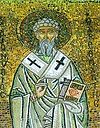

| Previous day | Next day |
| Old Style
October 3
|
Wednesday |
New Style
October 16
|
|
18th Week after Pentecost.
Tone 8.
Fast Day. |
Wine and oil allowed.
|
![]() Hieromartyrs Dionysius the Areopagite (96), bishop of Athens, the priest Rusticus, and the deacon Eleutherius (96).
Hieromartyrs Dionysius the Areopagite (96), bishop of Athens, the priest Rusticus, and the deacon Eleutherius (96).
St. John the Chozebite, bishop of Caesarea in Palestine (532). Blessed Hesychius the Silent, of Mt. Horeb (6th c.). St. Dionysius, recluse of the Kiev Caves (15th c.). Uncovering of the relics of St. Joseph, elder, of Optina Monastery (1988).
New Hiero-confessor Agathangelus (Preobrazhensky), metropolitan of Yaroslavl (1928).
St. Jerome of Aegina (1966). Hieromartyrs Dionysius, bishop of Alexandria, and the deacons Gaius and Faustus (ca. 265).
Repose of Blessed Olga, fool-for-Christ, of Bogdanoya Bari and St. Petersburg (1960).
Thoughts for Each Day of the Year
According to the Daily Church Readings from the Word of God
By St. Theophan the Recluse

Wednesday. [Phil. 2:24-30; Luke 6:46-7:1]
And why call ye me, Lord, Lord, and do not the things which I say? Why do they call Him Lord, but do not do the Lord’s will; that is, why do they not acknowledge His lordship in their deeds? Because they only call with their tongue, and not with their heart. If their heart were to utter: “Lord, Thou art my Lord,” then complete readiness would abide in it to submit to the one whom they confess as their Lord. But since they do not have this, their deeds do not match their tongue; whereas deeds always match the heart. All right, so there is no point in calling: “Lord, Lord”? No, not so. But it is necessary to make the external word match the inner word, which is the feeling and disposition of the heart. Sit and reflect upon the Lord and yourself: what is the Lord and what are you? Think about what the Lord has done and still does for you, why you live and how it will end. You immediately will come to the conviction that there is no other way than to steadfastly fulfil the Lord’s entire will; there is no other path for us. This conviction gives birth to a readiness to fulfil in deed what is expressed by the word “Lord.” With such readiness a need for help from above will be awakened, and from it the prayer: “Lord, Lord! Help me and give me strength to walk in Thy will.” And this call will be pleasing to the Lord.

